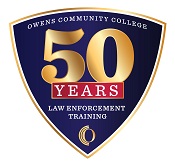|
Founded in 1970, the Ohio Basic Peace Officer Training Academy at Owens Community College is offered in cooperation with the Ohio Peace Officers Training Commission.
Police academy students take courses in patrol operations, firearms, defensive tactics and criminal investigation using modern, high-tech police equipment. Students also receive expert instruction from local police officers, sheriff’s deputies and corrections officers, as well as state and federal agents.
Successful graduates are eligible to be certified as police officers in the State of Ohio.

Department of Criminal Justice and Ohio Basic Peace Officer Training
Administration
|
Toledo Campus
|
Phone
|
Email
|
|
Dr. Michael Pfahl, Dean
|
Heritage Hall 106Y |
(567) 661-7270 |
michael_pfahl@owens.edu |
|
Mark King, Chair
|
Center for Emergency Preparedness (FTS) 121 |
(567) 661-7439 |
mark_king@owens.edu |
Accreditation
Accredited by the Ohio Attorney General - Ohio Peace Officer Training Commission (OPOTC.) Accreditation is ongoing with unannounced on-site inspections by an OPOTC Field Representative. Full on-site inspections are done every three years. The last full on-site inspection was conducted February 2017. For more information concerning accreditation standards, contact the Ohio Attorney General Mike DeWine, 30 East Broad Street, 14th Floor, Columbus, Ohio, 43215, phone number 800-282-0515 or 614-466-4986, web address www.ohioattorneygeneral.gov.
Student Learning Outcomes
Student will be able to:
- Demonstrate the ability to make correct and ethical decisions
- Apply basic criminal law to various events
- Write various criminal justice reports
- Demonstrate correctly the procedure to make a felony stop and arrest
- Demonstrate correctly traffic stop operations
Employment Opportunities
With an ever-increasing demand for well-educated police, graduates can expect to find employment in state and local law enforcement agencies. Police work can be dangerous and stressful because officers pursue and apprehend persons who break the law and then either issue citations or give warnings, depending on the nature of the crime. Officers spend a good deal of their day writing reports and maintaining records that will be needed if they testify in court.
Education requirements for police officers range from a high school diploma to a college degree. Job opportunities are most favorable for graduates with an associate’s degree or higher who also possess bilingual skills with training in police science or military police experience.
According to the Bureau of Labor Statistics in January 2014, police officers earned an average of $56,980 nationally. This figure did not include overtime wages. They also received paid vacation, sick leave and medical and life insurance. Many retire at half-pay after 25 or 30 years of service.
Most police officers, sheriffs and detectives work for local governments. The rest work for state or federal police agencies.
Through 2022, the Bureau of Labor Statistics projects employment for police officers and detectives to increase approximately 5 percent nationally. Regional job growth varies in part due to state and local funding.
Student Advisement
Students who have or acquire a felony conviction or a conviction regarding drugs, weapons, domestic violence or moral turpitude will find employment in the criminal justice field extremely unlikely.
|